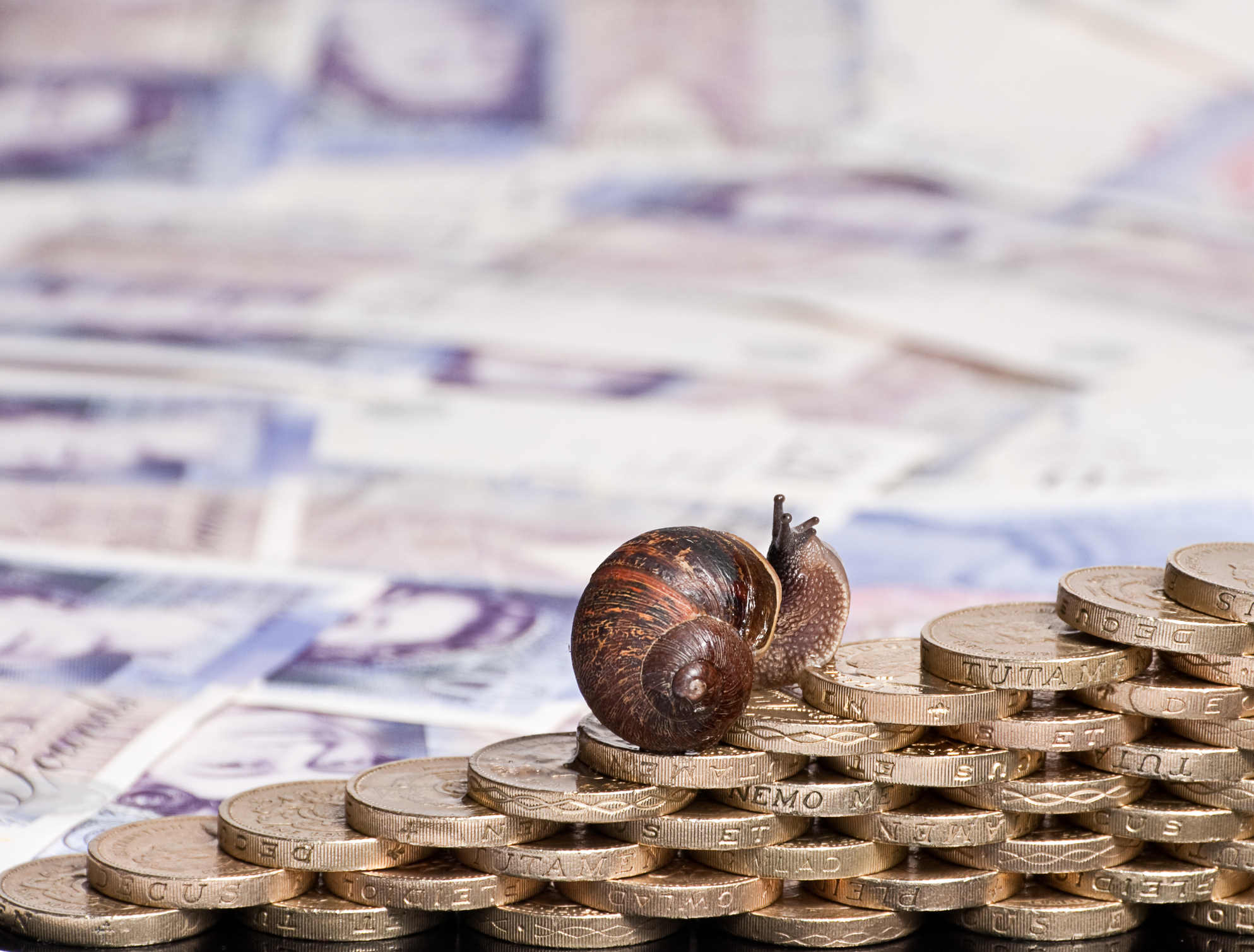What is stagflation and what can be done about it?
The UK economy is showing signs of weakness, but inflation remains stubbornly high – a dangerous combination that economists call ‘stagflation’


Get the latest financial news, insights and expert analysis from our award-winning MoneyWeek team, to help you understand what really matters when it comes to your finances.
You are now subscribed
Your newsletter sign-up was successful
Want to add more newsletters?
Stagflation is one of the most-feared words among economists and policymakers. With the UK struggling to revitalise growth, and with inflation proving stubborn, is the UK sleepwalking into stagflation?
Inflation jumped to 3.4% in December. The Bank of England aims for a rate of 2%, so while inflation is not out of control, it is well above the target.
Meanwhile, a 0.3% rise in UK GDP during November was a rare positive, with the country having been struggling to invigorate growth for some time.
MoneyWeek
Subscribe to MoneyWeek today and get your first six magazine issues absolutely FREE

Sign up to Money Morning
Don't miss the latest investment and personal finances news, market analysis, plus money-saving tips with our free twice-daily newsletter
Don't miss the latest investment and personal finances news, market analysis, plus money-saving tips with our free twice-daily newsletter
The economy is not on a strong footing, with UK unemployment running at a five-year high of 5.1% in the three months to November.
This combination of sluggish growth and stubborn inflation – known as stagflation (a portmanteau of ‘stagnation’ and ‘inflation’) – is a central banker’s worst nightmare, as highlighted in the November report from the Bank of England’s Monetary Policy Committee (MPC).
“Both the upside and downside scenarios outlined in the November Monetary Policy Report are likely to occur, leading to mild stagflation,” said Michael Saunders, senior economic advisor at Oxford Economics and a former MPC member. “Those scenarios are not mutually exclusive.”
How does stagflation occur?
“Stagflation arises when there are rising prices in an economy, but no growth or stagnation,” Jane Sydenham, investment director at Rathbones Investment Management explains.
“In the UK, where the economy is growing slowly, services wage inflation has been persistently stronger than the average, as there have been skills shortages.
“Wage inflation in hospitality where many employees are lowly paid has been quite strong, and the increase in the minimum and living wage has added to that.”
Stagflation can have dire economic consequences, in no small part because it confounds the usual fiscal logic. Prices shouldn’t go up when we have less money to spend.
“Generally, inflation is accompanied by growth, as salaries and prices usually rise in response to growing demand,” said Sydenham, adding that stagnation is “damaging, because costs rise, but there is no growth to compensate for rising costs, and so the economy becomes less productive”.
The UK’s current stagflationary predicament arises from several adverse supply shocks over recent years, including Brexit, the Covid pandemic, rising energy prices and hikes to National Insurance contributions, says Saunders.
“The scarring from these shocks has lifted inflation expectations, contributing to sticky pay growth, and led to heightened uncertainty, creating a desire for higher precautionary savings and discouraging investment,” he said.
That lack of investment – as well as the higher interest rates required to restrain inflation – have acted as a brake on consumer spending, which is further hampering economic growth.
What can central banks, policymakers and government do about stagflation?
Stagflation is a tricky problem for governments and economists to solve. Inflation usually results from too much economic activity, while stagnation usually results from too little.
The policy levers that governments and central banks use to combat them are therefore opposites.
The usual solution for a weakening economy is to cut interest rates, thereby making borrowing cheaper and, hopefully, stimulating more activity, but the usual cure for high inflation is to hike interest rates in order to rein in spending.
These opposite ends of the scale – economic contraction versus inflation – are what central bankers typically try to balance when deciding where to set interest rates.
Tackling both together is therefore extremely difficult.
“In general terms, governments need to stimulate growth, through tax breaks and investment incentives,” said Sydenham.
Central banks, meanwhile, need to tread a very careful line between stifling growth and fueling inflation.
“The MPC is likely to cut rates gradually this year,” said Oxford Economics’ Saunders. “Sticky pay growth will prevent it from easing rapidly in response to sluggish growth and rising unemployment.”
How can you prepare for stagflation?
Kalpana Fitzpatrick, digital editor of MoneyWeek and author of Invest Now, said: “Persistent high inflation is not good news for cash savings, as the value of your cash can erode quickly if it can’t keep up with price rises.
“But it is still important to hold cash savings, especially during turbulent times. Everyone should look to hold onto at least six months’ worth of income as emergency cash savings. This is money you can use to help pay for unexpected costs – anything from losing your job to a broken boiler.”
Fitzpatrick added: “If you don’t have an emergency fund, now is the time to build one as we continue to face price rises and stagflation. Always keep emergency money in an easy-access savings account.
“If you have investments, stagflation could mean a squeeze on profit margins and you may see the value of your investments go down. Although this can cause concern, the key thing is not to panic or take your money out. Stock market ups and downs are normal in investing, and the best way to smooth out the returns is to continue drip-feeding small amounts into your investments each month and ride out the storm.”
Raymond Backreedy, chief investment officer at Sparrows Capital, echoes these points and stresses the importance of diversification.
“One should remain invested and allocate according to the strategic asset allocation that best suits the end investor risk appetite, drawdown and tolerance for loss,” he told MoneyWeek. “We emphasise a globally diversified multi asset portfolio, where the main return/risk drivers are from listed equities and defensive assets are from high quality global sovereign short to mid duration bonds.”
Get the latest financial news, insights and expert analysis from our award-winning MoneyWeek team, to help you understand what really matters when it comes to your finances.

Dan is a financial journalist who, prior to joining MoneyWeek, spent five years writing for OPTO, an investment magazine focused on growth and technology stocks, ETFs and thematic investing.
Before becoming a writer, Dan spent six years working in talent acquisition in the tech sector, including for credit scoring start-up ClearScore where he first developed an interest in personal finance.
Dan studied Social Anthropology and Management at Sidney Sussex College and the Judge Business School, Cambridge University. Outside finance, he also enjoys travel writing, and has edited two published travel books.
-
 What the government’s baby boomer retirement data says about the future of pensions
What the government’s baby boomer retirement data says about the future of pensionsA study of the retirement routes of people born in 1958 paints a worrying picture for people’s pension savings
-
 An experienced investor’s end of tax year checklist
An experienced investor’s end of tax year checklistThe clock is ticking down before the end of the 2025/26 tax year, when any tax-free savings and investment allowances are lost. For experienced investors, though, the deadline for some tax-saving schemes is even earlier.
-
 The French economy's Macron bubble is bursting
The French economy's Macron bubble is burstingCheap debt and a luxury boom have flattered the French economy. That streak of luck is running out.
-
 UK wages grow at a record pace
UK wages grow at a record paceThe latest UK wages data will add pressure on the BoE to push interest rates even higher.
-
 Trapped in a time of zombie government
Trapped in a time of zombie governmentIt’s not just companies that are eking out an existence, says Max King. The state is in the twilight zone too.
-
 America is in deep denial over debt
America is in deep denial over debtThe downgrade in America’s credit rating was much criticised by the US government, says Alex Rankine. But was it a long time coming?
-
 UK economy avoids stagnation with surprise growth
UK economy avoids stagnation with surprise growthGross domestic product increased by 0.2% in the second quarter and by 0.5% in June
-
 Bank of England raises interest rates to 5.25%
Bank of England raises interest rates to 5.25%The Bank has hiked rates from 5% to 5.25%, marking the 14th increase in a row. We explain what it means for savers and homeowners - and whether more rate rises are on the horizon
-
 UK inflation remains at 8.7% ‒ what it means for your money
UK inflation remains at 8.7% ‒ what it means for your moneyInflation was unmoved at 8.7% in the 12 months to May. What does this ‘sticky’ rate of inflation mean for your money?
-
 Would a food price cap actually work?
Would a food price cap actually work?Analysis The government is discussing plans to cap the prices of essentials. But could this intervention do more harm than good?